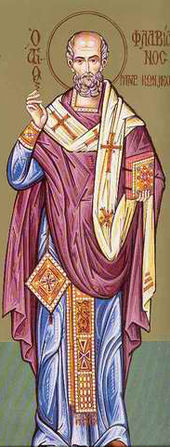Flavianus of Constantinople

Flavianus of Constantinople , Greek Φλαβιανός - Phlabianós (* in the 4th or 5th century; † August 11, 449 in Hypaipa ), was Archbishop of Constantinople from 446 to 449. At the Council of Ephesus from 449 , the "Synod of Robbers", if he represented the later recognized minority opinion, he was deposed and abused and died as a result. He is venerated as a saint in the Orthodox and Roman Catholic Churches . His Catholic feast day is February 18, the Orthodox commemorate him on February 16.
Life
Nothing is known about Flavian's origins and career. Before he was promoted to archbishop, he was a priest and overseer of the church treasury in Constantinople. His way of life was considered sacred .
When Flavian was named successor to Archbishop Proclus , it thwarted the plans of the imperial official Chrysaphios . This caused Theodosius II to demand a gift of homage from Flavian. The new archbishop had the antidoron brought to the emperor instead of gold , which Chrysaphios indignantly rejected. Theodosius' sister Pulcheria sided with Flavian, Eudokia with Chrysaphios.
The Christological controversy smoldering in the imperial church mixed with the palace intrigue . Chrysaphius and Eudokia won Theodosius over for the Monophysite party, which, under the leadership of the priest Eutyches and the patriarch Dioskoros I of Alexandria, took the view that the divine nature of Christ had completely "absorbed" his human nature; Flavian, supported by Pulcheria, taught that the incarnated Son of God in person unity is God and man ( doctrine of two natures ). A synod in Constantinople chaired by Flavian condemned Eutyches as a false teacher and excommunicated him in November 448 . When Theodosius convened a new council to Ephesus in 449 to sanction the Monophysite doctrine, Pope Leo the Great sent Archbishop Flavian his later famous teaching letter Tomus ad Flavianum , which prepared the doctrinal decision of Chalcedon. However, the letter was not read in Ephesus. There the Monophysite party prevailed amid tumult and violence. Flavian was physically abused, deposed, and driven from the city. He died shortly afterwards in exile.
When Theodosius died in 450, the balance of power shifted. Pulcheria married Markian , who succeeded her brother. This convened the Council of Chalcedon , which dogmatized the doctrine of two natures and declared Flavian a martyr . Pulcheria had his remains transferred to Constantinople and buried with great honors in the cathedral, the predecessor of Hagia Sophia .
The Church of San Flaviano (Giulianova) is dedicated to him.
literature
- Mario Nicoli: Flaviano di Costantinopoli, santo . In: Enciclopedia Italiana Rom 1932 ( digitized at treccani.it )
Web links
- St. Flavian ( Catholic Encyclopedia )
- San Flaviano, Patriarca di Costantinopoli on santiibeati.it (February 17th as commemoration day)
- Φλαβιανός on the pages of the Ecumenical Patriarchate (Greek)
Individual evidence
- ↑ Flavian was the last archbishop before Constantinople was elevated to patriarchy by the Council of Chalcedon in 451; he is therefore often called the patriarch .
- ^ Day of the translation of relics to Constantinople
- ↑ Συναξαριστής of the Orthodox Church of Greece (Greek, with a short biography)
| predecessor | Office | successor |
|---|---|---|
| Proclus |
Archbishop of Constantinople 446–449 |
Anatolios |
| personal data | |
|---|---|
| SURNAME | Flavianus of Constantinople |
| ALTERNATIVE NAMES | Flavian; Phlabianos |
| BRIEF DESCRIPTION | Archbishop of Constantinople |
| DATE OF BIRTH | 4th century or 5th century |
| DATE OF DEATH | August 11, 449 |
| Place of death | Hypaipa |